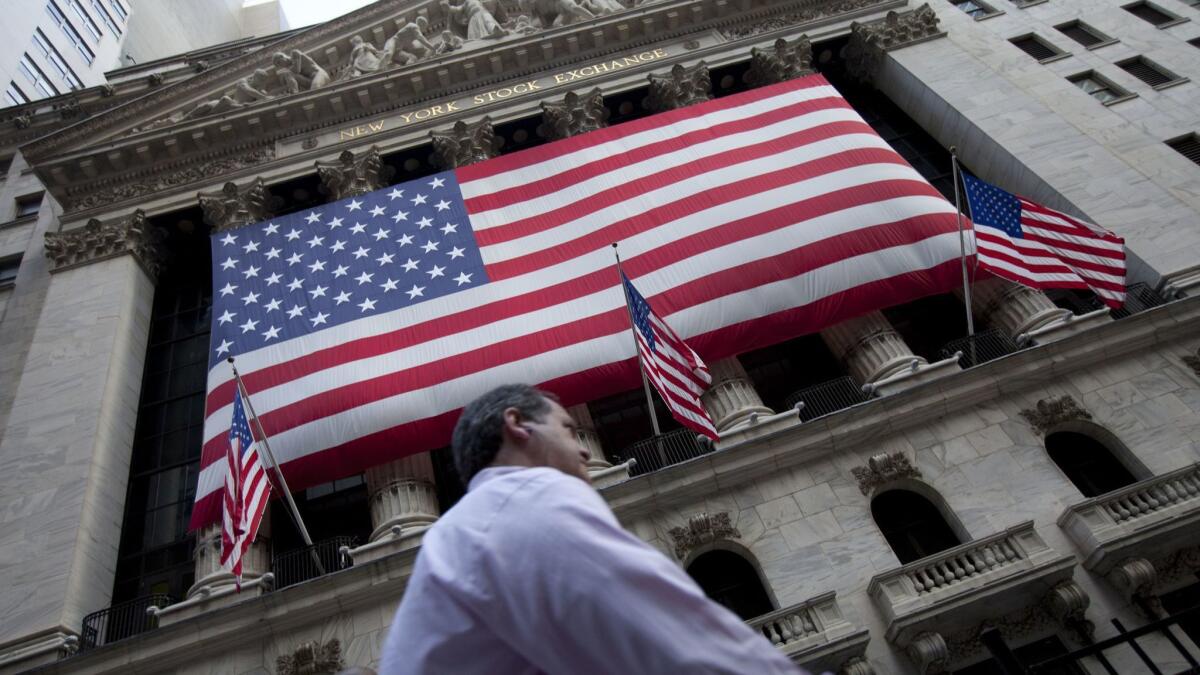Stocks dive as sanctions on China fuel trade-war fears; Dow drops 700-plus points

- Share via
Stocks plunged Thursday after the Trump administration slapped sanctions on goods and investment from China. The Dow Jones industrial average dropped more than 700 points — and into correction territory, down 10% from a recent high — as investors feared that trade tensions between the world’s largest economies would escalate.
The planned sanctions include tariffs on $48 billion worth of Chinese imports as well as restrictions on Chinese investments. Trump said he’s taking those steps in response to theft of U.S. technology, and the Chinese government said it will defend itself. Investors are worried that trade tensions would hurt U.S. companies and harm the world economy.
On Thursday they fled stocks and bought bonds, which sent bond prices up and yields down. With interest rates falling, bank stocks took some of the worst losses. Technology and industrial companies, basic materials makers and healthcare companies also fell sharply.
Peter Donisanu, an investment strategy analyst for the Wells Fargo Investment Institute, said the risk of a damaging trade war is still low because the Trump administration is targeting specific goods that aren’t central to China’s economy. That could change if the White House puts tariffs on products such as electronics or appliances imported from China.
“If the Trump administration really wanted to hurt China and start a trade war, then they would go after those larger sectors,” he said. Still, Donisanu said that after last year’s rally, investors are looking for new reasons to feel optimistic about stocks. With trade tensions in focus over the last month, they’ve had trouble finding any.
The Standard & Poor’s 500 index skidded 68.24 points, or 2.5%, to 2,643.69. The Dow Jones industrial average sank 724.42 points, or 2.9%, to 23,957.89. The Nasdaq composite slid 178.61 points, or 2.4%, to 7,166.68. The Russell 2000 index of smaller-company stocks fell 35.43 points, or 2.2%, to 1,543.87.
That brings the S&P 500 down 8% from its record high reached Jan. 26. The Dow is down 10% from its record high, also reached Jan. 26. The Nasdaq is down 5.6% from its record high, which it reached just 10 days ago.
The Dow and S&P 500 have erased all their gains for the year.
Construction equipment maker Caterpillar retreated 5.7% on Thursday to $146.90, its worst loss since mid-2016. Aerospace company Boeing slid 5.2% to $319.61.
Investors also sold some of the market’s biggest recent winners. Among technology companies, Microsoft fell 2.9% to $89.79, and Alphabet, Google’s parent company, slid 3.7% to $1,053.15. Online retailer Amazon declined 2.3% to $1,544.92.
This month the Trump administration ordered tariffs on imported steel and aluminum, and stocks dropped as investors worried about the possibility of tougher restrictions on international trade and smaller profits for corporations.
Their fears eased when the administration said some countries would be exempt from the tariffs. That continued Thursday, as U.S. Trade Representative Robert Lighthizer said the tariffs won’t apply to the European Union, Canada, Mexico, Argentina, Brazil or Australia.
Donisanu, of Wells Fargo, said the Trump administration isn’t necessarily hostile to trade but wants to get other countries to revise the terms of the United States’ trade deals.
“This is probably intended to get China to get more serious in discussions around violations of intellectual property rights and addressing those issues,” he said.
Bond yields fell. The yield on the 10-year Treasury note slid to 2.82% from 2.88%. Falling bond yields are bad for banks because they force down interest rates on loans. Bank of America shares slid 4.1% to $30.55. JPMorgan Chase shares sank 4.2% to $109.95.
Utility companies and real estate investment trusts rose. When bond yields decline, investors often bid up those stocks and others that pay big dividends.
A day earlier, the Federal Reserve raised interest rates and said the U.S. economy and the job market continued to improve over the last two months. The Fed expects to raise rates three times this year, although some investors think a fourth increase is possible. The Fed also said it might raise rates three more times next year instead of two.
AbbVie plunged 12.8% to $98.10 after it reported disappointing results from a study of its cancer therapy Rova-T. AbbVie canceled its plans to ask for faster approval of Rova-T as a treatment for small cell lung cancer, but other studies are continuing. Other healthcare stocks also sank.
Guess soared 28.3% to $19.91 after the clothing company issued quarterly results that beat expectations and gave strong annual forecasts.
Benchmark U.S. crude oil fell 87 cents, or 1.3%, to $64.30 a barrel in New York. Brent crude, used to price international oils, fell 56 cents, or 0.8%, to $68.91 a barrel in London.
Wholesale gasoline remained at $2.01 a gallon. Heating oil fell 1 cent to $1.99 a gallon. Natural gas fell 3 cents to $2.62 per 1,000 cubic feet.
Gold edged up $5.90 to $1,327.40 an ounce. Silver fell 3 cents to $16.39 an ounce. Copper fell 4 cents to $3.02 a pound.
The dollar fell to 105.61 yen from 106.10 yen.
Overseas markets mostly fell. Germany’s DAX sank 1.7%, the CAC 40 in France dropped 1.4%, and Britain’s FTSE 100 slid 1.2%. Hong Kong’s Hang Seng lost 1.1%. The Nikkei 225 in Japan gained 1%, and the South Korean Kospi rose 0.4%.
UPDATES:
2:25 p.m.: This article was updated with closing prices, context and analyst comment.
1:05 p.m.: This article was updated with stock indexes’ closing levels.
12:40 p.m.: This article was updated with market prices, context and analyst comment.
8:35 a.m.: This article was updated with market prices and context.
This article was originally published at 7:15 a.m.
More to Read
Inside the business of entertainment
The Wide Shot brings you news, analysis and insights on everything from streaming wars to production — and what it all means for the future.
You may occasionally receive promotional content from the Los Angeles Times.










